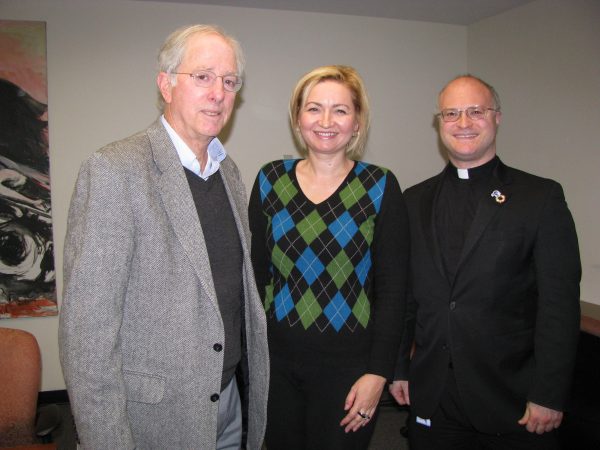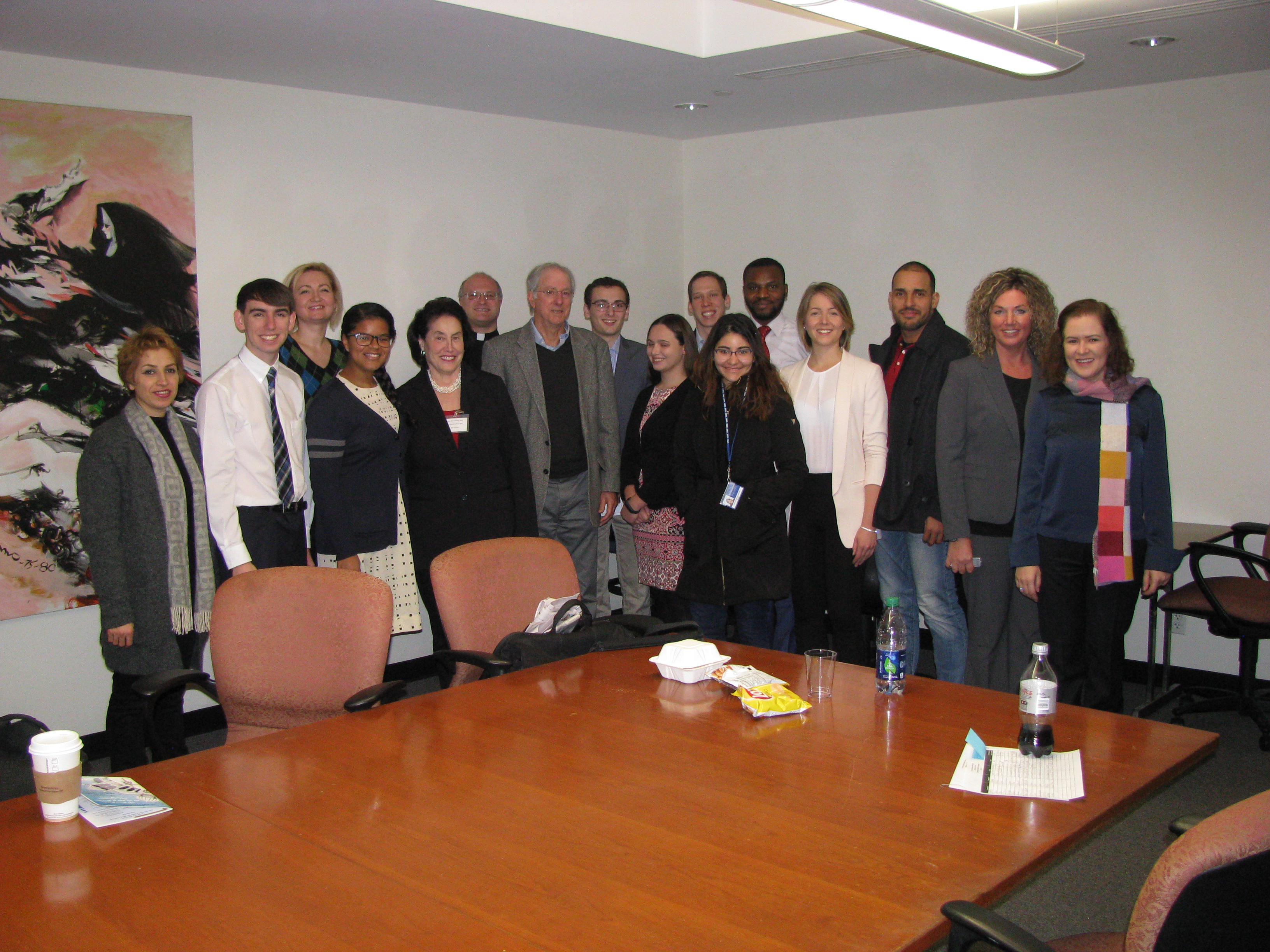On Sunday, 12 November 2017, Seton Hall University hosted the Seventh Annual Dr. Marcia Robins Wilf Lecture, featuring Ambassador Dennis Ross. This lecture was organized in celebration of the mission of the Sister Rose Thering Fund at Seton Hall, marked its 25th anniversary this year. Every year, a distinguished speaker is invited to present on topic of peace and inter-religious dialogue.
Ambassador Dennis Ross started his lecture with highlighting overall regional issues: Israeli-Palestinian conflict, Iran, Syria, Saudi Arabia, Lebanon. Ambassador informed the audience that he wanted to use the opportunity and talk about religion as it relates to the peace process.
Ambassador Ross: “There is a religious element to the broader conflict in the region. There is a struggle of identity in the Middle East. Islam is one of the greatest religions in the world. Islam is not an ideology. Islamists are those who take the ideology of Islamism-which is an ideology of power, control, violence, and exclusion- and they use it as a tool to seek power. That is what is shaping much of a conflict and much of the struggles within the region: the struggle for identity. Today I want to talk about the fact that religious leaders have not played a significant or contributing role to try to make peace in the Middle East. It is something they should have done, but they have not done it.”
Ambassador Ross: “How many people present tonight think that the Israeli-Palestine conflict has a religious connection? Or is a part of the religious content? (people raised their hands) So, that’s about 90% of the people present here tonight. What has guided American Presidents when they think about this issue is what I would describe as religious dimension. I went to every Administration, every President, and looked at what drove them. Not only in regard to the relationship with Israel or Middle East, but also towards the issue of peace. I can conclude that those American Presidents who were most committed to the idea of achieving peace were the ones who showed some kind of religious imperative to do it. When he was no longer President, Franklin Roosevelt was going to go solve the problem in the Holy Land. Jimmy Carter, when he was President, described the peace issue as the one he prayed about for inspiration and support. Then, the Reagan Peace Plan is another example. Bill Clinton: the night before the ceremony at the White House on 13 September 1993, ‘the handshake’ between Rabin and Arafat, when they signed the accord granting limited Palestinian autonomy, Clinton could not sleep. What did he do? He read the Bible. When he gave his speech the next day, he made a reference to it. For him and his predecessors, making peace in the Holy Land was not just a noble endeavor, but it was an imperative. Whether they talked about it or not, it was clearly partly what motivated them. So, you would think that maybe religious leaders would take more interest in it. If you look at the pre-steps of the great religious faiths, they have common themes: love your neighbor, accept the stranger, do not kill. In the Jewish tradition, to be a seeker of peace, is the highest call. In the Jewish liturgy, to save a life is to save the world. In the Quran, you can find the exact same formulation. So, why haven’t we not seen common religious leaders among Israelis, among Palestinians, among Arabs? Why have they not played this role? What we have, unfortunately, is a legacy of extremist religious leaders who had helped to perpetuate the conflict. They have not helped in any way to try to resolve it.”
Ambassador Ross talked about the visit of the Roman Pope to Jerusalem in 2000. It was done with intentions to promote peace and to create the source of inspiration for the religious leaders in the region. Ambassador reflected on his conversations with the Vatican Foreign Minister prior to this visit and his suggestions regarding the speech.
Ambassador Ross: “How did religion enter into my experience of negotiation and mediation? In one interesting way it did because I am Jewish. For many people, that became a source of criticism. Your religion should not intervene with whether you can be a negotiator or a mediator. One thing that penetrates this conflict is this notion that you should be either “for” or “against”. You can never be for “both”. You can never be someone, who is trying to ensure the needs of “each”. There was always an undercurrent in the media throughout the period when I was a negotiator. There were articles that would say that the reasons I was hard on the Arabs was because I was Jewish. Never mind the fact that perhaps I was hard on those policies in an effort to advance peace. Or maybe I was adopting positions that were reflective of the President or the Secretary of State. This was always a landscape, but it did not affect the negotiations.”
Later, Ambassador Ross talked about the issues that were discussed in the negotiations that related to the religious heritage. He spoke about the Interim Agreement, and about the complexity of the context of religious heritage in that agreement. He shared that while working on that agreement, the parties had to negotiate the access to all religious sites that were significant to both, Israelis and Palestinians. They had to address this issue from administrative, political and religious points because these religious sites had value to the Muslims, the Jews and the Christians. The parties had to agree to provide free and safe access to all religious sites to all people, regardless of their faith. When parties could not agree on this issue, Ambassador Ross suggested that sovereignty of those sites should belong to God, instead of a certain state. Unfortunately, the parties did not agree to this suggestion. Ambassador Ross shared that years later, both negotiators came back to him and reflected on his suggestion, referring to it as “not a bad idea”. Ambassador concluded by saying that this example illustrated a religious issue that is a part of the historic conflict for which parties have been trying to find a solution.
Ambassador Ross: “In a lot of negotiations, what you try to do is you focus on what you can do. You get it done, and you set aside those things that are too hard for now, so you can deal with them later.”
The Ambassador finished with answering the questions from the audience. Questions ranged from the opinion regarding the two-state solution to the current situation in Saudi Arabia.

Photo: (left to right) Ambassador Dennis Ross, Borislava Manojlovic, Ph.D., Rev. Brian Muzas, Ph.D.
This interview was recorded by Vera Dimoplon.
